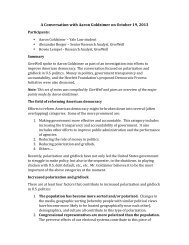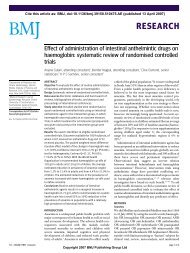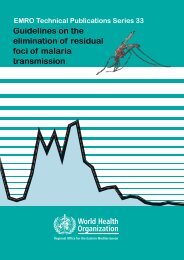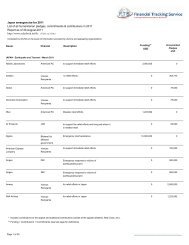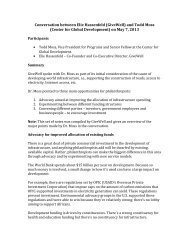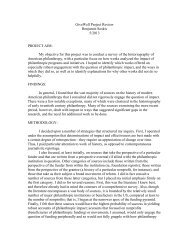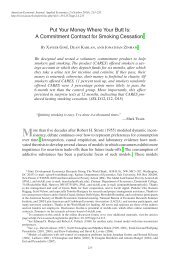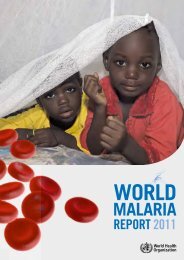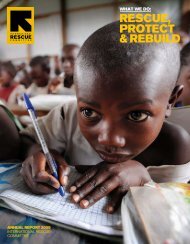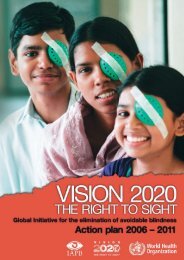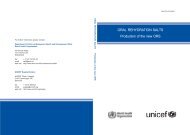Annual Report 2005 - Doctors Without Borders
Annual Report 2005 - Doctors Without Borders
Annual Report 2005 - Doctors Without Borders
Create successful ePaper yourself
Turn your PDF publications into a flip-book with our unique Google optimized e-Paper software.
ANGOLA $2,776,749International staff: 80 National staff: 1,100Providing care forneglected diseasesThree years after Angola’s civil war cameto an end, 70 percent of Angolans stilllack access to basic health care. MSFcontinued to help fill this void throughsupport of hospitals and health centersin the provinces of Bié, Bengo, Kuito, LundaNorte, Malanje, Cuanza Sul, Moxico,Huambo, Cuanda Cubango, Huila, andUige. MSF projects focused particularlyon care for people with malaria, sleepingsickness, tuberculosis (TB), and, mostrecently, HIV/AIDS. In <strong>2005</strong>, MSF alsoprovided emergency assistance when thecountry was confronted with an outbreak ofthe deadly Marburg virus.ARMENIA $950,000International staff: 22 National staff: 104Confronting sexually transmitteddiseases and mental illnessMSF worked to reduce the spread of HIV/AIDS and other sexually transmitteddiseases through a clinic in the Shirakregion and an HIV-prevention project inVanadzor city. MSF also provided outpatientpsychiatric, psychological, andsocial support to people with mentalillness in Gegharkunik province. MSF issupporting and renovating governmenthealth structures in the regions ofVardenis and Tshambarak, home to manyAzerbaijani refugees.BURUNDI $345,000International staff: 54 National staff: 755Helping people duringpost-war reconstructionMSF provided basic health servicesthrough health centers and hospitals inthe provinces of Bujumbura, Karuzi, andMakamba. MSF also treated and counseledvictims of sexual violence and providedcare for approximately 120 patients withsexually transmitted diseases each monthin a health center for women in the capital,Bujumbura. MSF continued to treat warwoundedcivilians from Bujumbura Rural,the country’s last province still at war.<strong>2005</strong>project supportChinaA woman waits toreceive counselingat MSF’s HIV/AIDSclinic in Nanning.CAMEROON $500,000International staff: 9 National staff: 68Treating AIDS and Buruli ulcerMSF operated an HIV/AIDS project in thecapital, Yaoundé, and in the city of Douala,providing antiretroviral treatment to morethan 1,200 people. MSF also ran a treatmentprogram in the Akonolinga district for thoseliving with Buruli ulcer, a disease similar toleprosy that is treatable only with surgery.CHAD $1,500,000International staff: 56 National staff: 405Assisting Darfur refugees andvaccinating thousandsIn the last two years, an estimated 200,000people entered eastern Chad in theireffort to flee attacks in the Darfur region ofSudan. MSF provided medical, surgical,pediatric, and maternal care as well asfood, water, and shelter to many of the83,000 refugees living in four camps nearthe Sudanese border. In the southwesterndistrict of Bongor, MSF ran a malariaproject and a surgical training program, andalso carried out a meningitis-vaccinationcampaign, immunizing 196,000 peoplebetween the ages of 6 months and 30years. MSF also vaccinated 500,000children against measles in the south andin the capital, N’Djamena.CHINA $397,470International staff: 16 National staff: 72Expanding AIDS care andhelping the vulnerableMSF has strived to expand HIV/AIDStreatment and care in a country where thedisease remains highly stigmatized. Inthe city of Xiangfan, in Hubei province, andthe southern city of Nanning, MSF rancomprehensive HIV/AIDS programs thatprovide antiretroviral treatment to morethan 300 people living with the disease.Additionally, MSF provided psychosocialsupport to children living on the streets ofBaoji, Shaanxi province. After MSF withdrewfrom North Korea in 1998, theorganization started to provide shelter,clothing, food, and medical care tohundreds of North Korean refugees hidingin China and other countries.COLOMBIA $847,720International staff: 49 National staff: 151Assisting victims of civil warIn Colombia, violence is the primary publichealth hazard and the leading cause ofdeath. MSF ran mobile clinics that providedbasic medical and mental health care tocivilians in the departments of Caqueta,Choc, Córdoba, Sucre, Bolívar, Nariño, Nortede Santander, Tolima, and Cundinamarca,© Ashley Gilbertson/Aurora15us annual report <strong>2005</strong>



